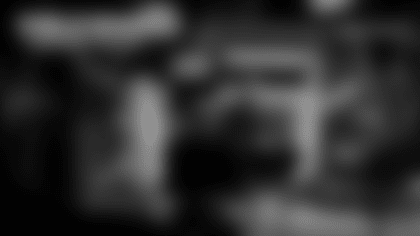MOBILE, Ala. – As impressive as the Atlanta Falcons' mid-season about-face was, the team's defensive turnaround was even more impressive.
Prior to their bye in Week 9, the Falcons were 30th in Defensive DVOA (Defense-adjusted Value Over Average) and allowing 31.3 points per game, which were the second-most in the league. Atlanta finished the 2019 season ranked 20th in Defensive DVOA, making it one of the most improved units in the NFL.
RELATED CONTENT
The Falcons named Raheem Morris defensive coordinator following the season after he played a large role in helping the unit improve. Morris transitioned to the defensive side of the ball during the bye week and split play-calling duties with linebackers coach Jeff Ulbrich. Morris has a wealth of experience on the defensive side of the ball, having coached NFL defensive backs for eight seasons.
For some who cover the league, Morris' presence is a reason to believe the defense may continue to play like the cohesive unit that stymied some of the league's top offenses down the stretch.
"I think that Raheem is really good," NFL Network insider Ian Rapoport said. "I had always kind of wondered why he wasn't getting more defensive coordinator looks. I'd wondered why he was on offense. I had a lot of questions, because he's always been a really good coach. And then he was actually given the opportunity, and I thought he was great. So, I don't see why it wouldn't be sustainable."
After the bye week, Morris began calling the plays for the defense on third downs and inside of the red zone, while Ulbrich called the plays on first and second down. This type of specialized approach allowed both coaches to master their respective parts of the game plan in quick fashion and improve both areas greatly.
The Falcons allowed the fifth-most explosive passing plays and the 11th-most explosive runs through the first eight weeks in 2019. During their final eight games, the Falcons became much less prone to give up the big play. Atlanta ranked 15th in explosive pass plays allowed after the bye week and improved to allow the sixth-fewest explosive runs.
Perhaps their biggest improvements came on third down and in the red zone. Prior to the bye, opponents converted 53 percent of the time on third downs, after the bye that number dropped drastically to just 25.8 percent. Similarly, teams went from scoring a touchdown on 68.7 percent of their red zone trips in the first half of the season to 42.8 percent during the second half.
Given the improvements the Falcons made in the two areas Morris took over play calling for, it seems fitting that he would be given oversight of the entire unit.
"He's still a younger coach in my mind," NFL analyst Andy Benoit said of the 43-year-old Morris. "He's kind of in that sweet spot; he's a veteran, younger coach. Those younger coaches tend to see the game through the lens of a scheme than an older coach sometimes. I wonder if there was maybe something there that clarified it for the players as well, it's a different voice in the room for them."
Having worked with the Falcons' wide receivers since 2016, Morris also offers a unique perspective to share with the team's secondary. Morris possesses the knowledge of how route combinations and progressions work from an offensive point of view, and he knows how to effectively communicate that to Atlanta's defensive backs after coaching that position for many years.
That ability to communicate had a large impact on the Falcons' pass coverage. After allowing six of the first eight quarterbacks they faced to have a passer rating of 120, the Falcons allowed just one quarterback – Jameis Winston in Week 12 – to top a rating of 100 in the second half of the year.
According to Warren Sharp's TOARS (Target & Output Adjusted Receiving Success) metric – which is further explained here – the Falcons had arguably the most drastic mid-season turnaround of any pass defense. Prior to the bye, Atlanta ranked 25th with a TOARS rating of 5.24. After the bye week, Atlanta was the No. 1-ranked pass defense by a decent margin with a TOARS rating of 3.65.
"The times I've been around him and the times I've watched him up close coaching, my guess is he's one of those calls-it-as-he-sees-it type of guys and maybe calls it a little harsher than he sees it if he needs to," Benoit said. "That's a good way to get a secondary's attention, I would assume. His diversity of background, too – different schemes, different staffs, both sides of the ball – is unusual."
It was the defense that set the tone and led the way for the Falcons during their 6-2 run over the second half of the season, and the unit's style of play looked closer to the one coach Dan Quinn has always envisioned.
There are still some personnel moves to be made this offseason to improve certain aspects of the defense, chief among them the pass rush. Yet the drastic improvements the team made down the stretch were eye-opening for some who cover the league. It was enough to convince owner Arthur Blank to opt for continuity moving forward, and if it was a matter of finding the right coaching fits, the Falcons defense could be much sounder in 2020.
"It's interesting, because the way they ended kind of answered a lot of questions," Rapoport said. "If you had asked me at the middle of the season, I'd say, 'some help on defense and maybe figure out who the defensive coordinator is.' But, because of the way their season transpired, they actually answered a lot of the questions about themselves during the season."















